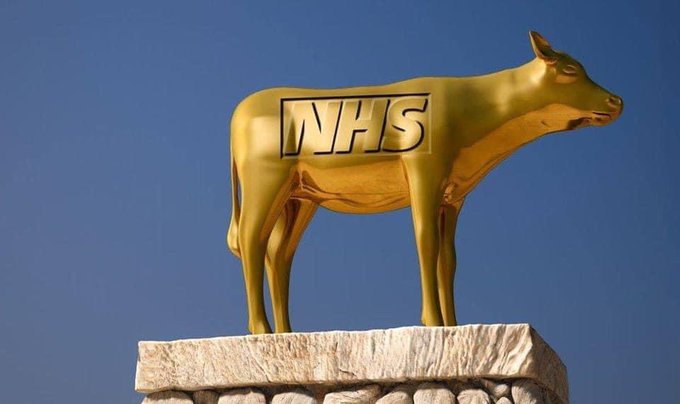We’ve become all too used to seeing stories of how the NHS has failed dismally to run safe, effective and humane maternity services, so common have these scandals become. The string of names of dead and severely disabled babies who might have survived and grown up to be healthy adults seems to lengthen by the year.
However there has recently been published by Sky News a story that shows that it’s not just the very young that are at risk of poor treatment by the NHS but also how the vulnerable elderly are suffering from piss poor NHS treatment. Elderly patients with dementia are entering hospital following falls or infections, stuff that should and could be treated effectively but whilst in hospital are increasingly suffering from fits of delirium that appear to be caused or exacerbated by bad NHS treatment.
The Sky article outlines how elderly patients who may be presenting with relatively and comparatively mild dementia issues who suddenly go down hill cognitively after entering NHS hospitals. The article states that part of the reason why elderly patients suffer cognitive decline so swiftly upon entering NHS hospitals is because of the terrible way that they are treated. Patients are treated like inhuman ‘lumps’ and moved around the hospital on trollies at all times of the day and night, not for reason of the individual patient’s needs, but for the needs or requirements of the staff and management. This constant moving around and putting the patient in situations where they don’t know where they are or why they are there which causes confusion to the patient and also sleep deprivation. This sleep deprivation exacerbates the patient’s dementia and causes episodes of delirium. The article added that each episode of delirium damages the brain and makes it less likely that the patient will recover or return to their original post dementia diagnosis mental faculties.
The Sky News article makes for anger inducing reading. The cases that they’ve highlighted are ones where relatively mentally together elderly people who enter NHS hospitals are having what’s left of their mental faculties ruined by terrible and inhumane NHS treatment. In one case an elderly patient tried to get the attention of a nurse but the nurse just waved the gesture away as ‘she’s just waving to me’.
I defy anyone with any sort of human feeling to read the Sky article about the appalling and counterproductive treatment Britain’s elderly are getting from the NHS and not be disgusted. Those who during the pandemic turned out and clapped the NHS like deranged performing Seals should take a moment to consider just what a monstrous and failing health service they were applauding.






I suspect SKY have an agenda here. If patients are moved, day or night, and I write as one who experienced both at Southampton General Hospital, it’s done not for the amusement of the staff and porters but for the welfare & best treatment of the patient.
Picture this, a patient arrives at any hospital running at 99% bed capacity. Step 1. ANY bed will do. Any bed is better than no bed. Step. 2 wait for a better bed to become available. Step. 3 relocate to the optimum bed for the patient’s best treatment at that time.
Elderly patients often present with more than one condition, and what starts off as pneumonia might become cardiac. Step. 5. Cardiac ward.
And then as the patient improves, but of course there are no care homes to which to discharge and no care packages to be had, Step 6, a spot of bed-blocking in “any bed will do”
So don’t knock the NHS, please. We’ve had a government for 13 years perfectly capable of running it down without any assistance from SKY or us. I’m sure the directors of SKY would like to see it privatised and run by Capita (or similar) in whom they no doubt have shares.
Or there is always the US model, unaffordable to 1/3 of the population
I completely agree tht some patients might be have to be moved for medical reasons, but there are other patients who are moved because of the effects of bad management.
I’ve seen some appalling stuff in the NHS. My Mum was killed by poor treatment with inappropriate antibiotics, the mother of my child was nearly crippled by a badly administered epidural, we could not leave my late father in a major teaching hospital alone overnight after a fall because few of the staff in the hospital seemed to care much for the patients and my uncle, during treatment for cancer was placed in a side room containing bags of soiled bed linen. From what I’ve seen there is no way I would class the NHS as ‘the envy of the world’.
I have to knock the NHS as it all too often provides piss poor service to those who pay for it. As regards competing healthcare systems it is not a binary choice between two equally appalling (but for different reasons) healthcare systems of the UK and the USA. European nations seem to have managed to create healthcare systems that don’t result in bankruptcy for the patient nor having to risk pot luck as to whether you will get decent healthcare or not as is the case with the NHS.
I recently spent 3 weeks in my local hospital with a spine problem, on a small general medical ward. One of the occupants was an elderly man suffering from increasing dementia. His care home had no dementia trained staff so, while social services searched for suitable accommodation, he was plunked in hospital. The nursing staff were, also, not trained in dementia care, but they were brilliant in dealing with his anger, fear, and confusion. He was still there when I was discharged. For all I know, he’s still there. There may be a problem with NHS beaurocracy, possibly starting with Tosser Blair demanding nurses have a degree, leading to eminently suitable candidates looking elsewhere, up to adverts for Lifestyle Experienced Facilitators at £115,000 a year, but those 3 weeks showed me how dedicated and professional those doctors and nurses were.
That’s the problem with the NHS. It’s awful but not awful everywhere. There’s little or no consistency of care quality. For example I’ve seen some appalling examples of cruelty, lack of care and incompetence from the NHS but there are others, such as yourself who’ve seen more of its good side. I certainly agree with you on the subject of management bloat in the NHS but it’s not completely fair to blame Blair for all of this as the NHS has since the 1970’s had a culture of excessive management.
Please don’t mock the idea of nurses requiring a degree. My ex trained in the early eighties. Not much tek. records by hand. OK, it was more than bedpans and bed baths, and “hospital corners”, but if you’ve been in hospital recently you must have seen how the role of nurses has changed. Some are fulfilling the roles previously filled by doctors. Some prescribe, some carry out “minor procedures” (small ops.) others are using equipment with a control panel like a flight control panel. Yes please, I’d like my nurses to have the academic education commensurate to the complexity of the tasks they are completing.
(Cancer patient)
I agree that nursing has got more technologically complex and nurses now have more tasks than they once would have, like prescribing for example, but could not these skills be learned on the job rather than at a university? Could not competent A level holders (with science A levels of course) become nurses without having to go down the degree route? I worry also that making nursing a degree required profession is good for those who are careerists but put off and exclude those who might not be degree material but who have a vocation for nursing?
It’s no good having nurses with amazing qualifications if they don’t have the human feelings to not treat patients like dirt?
The excessive management, as I understand it, results from this “internal market” which I really don’t understand. When I first started working for the NHS as an external consultant in the mid/late eighties the “model” appeared to be clear. There was the NHS somewhere or other, the Regional Health Authorities and the District Authorities who undertook the day to day management of half a dozen or so hospitals and what ever else.
Then overnight it was NHS Trust this and NHS Trust that, and suddenly everything was being replicated at each hospital. The Regions vanished, any trace of centralisation & economy of purchase, ideas, & design vanished and each trust was reinventing the wheel.
Then it was CQC’s and PCT’s and as an architect trying to design stuff for these folks I began to lose the plot. The clinical bits I “got”, but the rows of desks I didn’t.
Towards the end of my career I found myself re-arranging desks ( on paper at least)in an office block nowhere near any hospital. The bods all had weird job titles like “governance” and “internal audit” and “IT-architect” (wtf). I asked a friend who worked there what this NHS organisation did. She whispered in my ear ” nobody really knows”.
The internal market should have brought efficiencies but it didn’t, it just added layers upon layers of previously unnecessary management. As for the local Trusts, the idea of decision making and procurement being closer to the patient might have worked but all that has happened is that admin and management that once was done centrally or at least regionally, ended up being duplicated across every trust.
It’s a bad sign when an organisation hs sections of it that knowbody knows what they do.
Spot on. Replication, repeat, confuse.
I worked for one hospital where as it happened my ex worked too. She ordered tens of thousands of pounds of kit for her patients. If “finance” paid within 28 days the trust received a hefty discount. “finance” couldn’t pay within 28weeks !! I know, my company were for ever chasing them for unpaid fees. The ambulance service were no better.
Replicate that across England & Wales and you can see where the money goes.
(I thought the “Internal Market” was the row of shops and the cafe in the hospital entrance )
I don’t really see the problem in awarding a person who has studied for 3 or 4 years with a degree. My ex, who has an RGN, still had weeks of classroom work followed by ward experience, followed by classroom.
I’m an architect, in the fifties/sixties the highest qualification awarded was a diploma, by the time I qualified it was a degree and a post.grad diploma, now it’s a degree and an MA. Same length of training, 7 1/2 years, but a recognition, surely, that with all that “book learning” we are entitled to stick a few letters after our names.
Personally I can’t see any “negatives” in awarding a nurse or an occupational therapist or a radiographer or a pharmacist with a degree if they’ve worked 3, 4 years.
Let’s face it, they don’t get paid any more and who knows it might attract more in to the profession, and don’t we need them?
I had a procedure recently, every last clinician came from the far east. I don’t care where they come from as long as they know what they are doing, but it comes to a pretty pass if we have to import our clinicians AND the equipment they use AND half the components I was specifying to build the place.
n’est pas ?
I have less issue with the sort of ‘sandwich’ course of the type that you said that your ex went through. The problem as I see it comes from those taking the degree route but who may have more book learning than practical experience. They might be qualified on paper but not so much when it comes to hands on stuff. Upgrading an RGN qualification to a degree by later specialist study might be a way to recognise achievement but without the barrier to entry of requirement of a degree to enter.
It’s interesting what you say about your profession. Once a degree wasn’t a requirement now it’s a degree plus an MA. Maybe this is because a degree isn’t what it once was when university was only reserved for the top 15- 20% of those who got A levels. The expansion of universities plus the commercialisation of higher education has degraded the value of degrees because they seem to be dished out with less required achievement levels than would once have been required. Jobs that would once have required just A levels for entry level now require degrees and I don’t thnk that this has improved services or commerce.
Maybe the answer to lack of staff in healthcare in particularly nursing is to make more routes available to allow people to enter this area. I compare unfavourably the thoroughly decent,humane and competent nurses of my youth, many of whom came from the West Indies and had basic nursing qualifications and the degree holding careerist nursing staff who can’t even be arsed to check whether an elderly patient can reach the food put in front of them.
There is, as you say, a greater technological factor with medicine and healthcare these days and this technological knowledge needs to be taught but is a degree route the best route? Learning achievement should be recognised but in what form is the big question? Has a degree requirement brought in more people to the nursing profession or is the degree requirement a roadblock to hiring?
I completely agree that we need to be producing more healthcare staff and more equipment and services at home. I don’t think that complete autarky in this area would be achievable but we should be able to train enough nurses and enough doctors and make enough basic equipment and supplies to avoid the situation where Britain had to go to hostile nations to find ppe during the pandemic.
On the subject of nurses requiring a degree, my late wife was a qualified State Registered Nurse (now Registered General Nurse), specialising in cardiology. Five years before retirement, she was told she had to obtain a degree to continue doing the job she had been doing for the previous 25 years, all in her own time, and at her expense. Having obtained that degree, she said she noticed nothing had changed apart from new, degree’d, nurses considered themselves too qualified to wipe bottoms of patients, and the number of Nursing Assistants increased (presumably to do the jobs the degree holders considered themselves too qualified to do). She also mentioned that she became really aware that there was a great difference between education and common sense.
Off topic, then the government made a degree a requirement to apply for the Police.
I wonder what qualifications an NHS Lived Experience Facilitator requires?
I can’t speak for your wife’s experience, but surely it makes sense to employ what were SEN’s (state enrolled nurses) or what ever they are called now, nursing assistants did you say ? to wipe bums and bathe patients ( at a lower rate of pay and shorter training period) than use more highly qualified staff?
I’d have been a bit miffed to have walked onto site and seen qualified joiners knocking up shuttering for concrete when they were better employed making door frames and bespoke windows.
Horses for courses ?
Agree that the basic lower level nursing jobs should be done by those with more basic qualifications. From what I’ve seen in the NHS some nurses seem to think themselves as ‘too good’ to do the basic nursing work. You make a good analogy with the joiners and shuttering makers. There should be some route to allow healthcare assistants to upgrade via training to become fully qualified nurses.
and finally (from me) and I quote:
The chief nurse at Health Education England has laid out ambitious plans to convert up to 3,000 nursing associates and assistant practitioners into registered nurses over the next three to five years.
Speaking at a major nursing conference, Professor Mark Radford announced a £40m investment in 2020-21 to “maximise” this route into the graduate-level profession, while acknowledging that it was “controversial”.
“There are many people out there who would like the opportunity to become a graduate registered nurse”
“We will be setting forward a programme to support as many of our nursing associates and our [assistant] practitioners to develop careers to become registered nurses,” he said during a keynote speech to nurse leaders.
“This route alone if we are to maximise it could add 3,000 additional registered nurses to support our workforce.” Nursing Times
Can’t disagree with that. Give those previously not on the qualified nursing path a way onto it. Good policy.
OK. I’ll hog a bit (!). 32 years ago the obstetrics consultant nearly killed my daughter. Years later I read in the local paper that where he’d failed with her, he’d succeeded with another.
As an architect I encountered waste upon waste, Short termism where we’d concert, at massive cost, a department for one purpose only to see it repurposed before the paint was dry on the walls. In one project I actually had the drylining partition team tear down partitions which had been up a week because some high-and-mighty had a change of plan.
With respect I think your awful awful experiences of the NHS has you tar the whole organisation with the same brush.
I worked, just for two years, for British Railways at a time when it was the but of every joke and Mrs T was hell bent on its destruction. Literally. Convert railways to roads and build a “Channel Bridge”.
Yet from the inside it was clear that what we had was a co-ordinated fully accountable generally fully functioning mostly reliable transport system which had largely been starved of meaningful investment for 20 years.
You are right. We experience what we experience and that colours our judgement.
With your case of the obstetrics consultant I wonder how many other babies they might have killed or damaged but were not linked to them? After all we can see from some of the recent NHS maternity care scandals for example the one in Kent, that babies who died from suspected poor treatment were listed by the medical staff as ‘stillbirths’.
I saw this sort of waste when I worked for a government department for a short while. There was profligacy galore with buildings having a regular decorative ‘refresh’ even when the offices were more than adequate for use. Whilst working for a small media charity I got to see just how bad the waste is in local government and how money will be wasted on stuff that isn’t needed, such as providing key councillors with a ‘built legacy’.
I completely admit that my experience and that of my family’s of the NHS has been informed by the really bad, incompetent and sometimes damned cruel and inhumane treatment that they’ve got from the service. The problem is that my experience is not unique. Some families have had worse. To get a more rounded picture of the NHS then you have to add in the Stafford Hospital Scandal, the Gosport scandal, the poor practises at Bristol that killed 11 babies, the Kent maternity scandal, the Morecombe Bay maternity hospital scandal, the failures in maternity again in Shrewsbury and Telford hospitals and many more.
It should be possible for a Western nation to provide comprehensive, universal and affordable healthcare to its citizens without turning its hospitals into lethal butchery centres and without resorting to a US system the costs of which are behind at least a quarter of personal bankruptcies. France, the Netherlands and Germany seem to manage this so why cannot the UK?
ON the subject of British rail, I seem to recall that after nationalisation BR inherited all the research and development that had been done by the Big Four companies. BR was therefore ahead of the game when it came to electrification, the use of diesel electric power (BR found that diesel hydraulic was too much tech bother) and signalling. BR could have jumped ahead with modernisation but the purse strings were controlled by central government and modernisation ended up on the back burner. It seems often to be the case with Britain that there’s a lack of money for the stuff that needs doing or needs funding and a surfeit of cash for stuff that is just ending up as worthless waste.
No intention to hog this. I’ve seen it from both sides, patient & consultant/employee.
My experience has been positive. What I HAVE seen is staff run off their feet, exhausted junior doctors barely open to keep their eyes open, abusive “me first” entitled patients and an estate (building stock) which has been allowed to decay until it has broken or was badly designed & built in the first place.
When I see a nurse who can’t be arsed to complete a task I see a nurse who is being pulled in so many directions, so distracted, she/he never gets to complete ANY task.
In July I was in a side ward for a week. I was forever being forgotten because each time somebody reached me door (open a crack) they were called away.
This is how it is. Blame the government not the NHS.
(thank you for reading, off now)
Hog away this is a good conversation :-). Everyone’s experience of the NHS is different. Yours seems to have been positive but the experiences of my family and me has not been so positive. My child was born via an extemely specialist pregnancy the details of which I will not go into but because the hospital in London didn’t have a protocol to deal with the aftercare and the paperwork they kicked us out of the hospital, with a newborn at 11pm on a January night facing a 140mile drive home to the Welsh borders.
When the NHS killed my Mum the family begged the doctors not to use their first line in antibiotics to treat an infection as the family knew that this antibiotic had not cured previous flare ups of the same infection. But the hospital practising tick box medicine insisted that we were the know nothings and gave the ineffective antibiotic anyway. The result of this error and arrogance was that by the time the doctors had realised their mistake the infection had taken hold and gone to far to be treated. My family and especially my late Mum and Dad also had truly awful home treatment from the NHS and they got very poor value from the thousands upon thousands that they’d paid in tax to fund the NHS. They ended up frightened to complain about bad service and bad treatment because they feared that what little that was good about NHS treatment such as their GP would be taken away from them if they complained.
Quality wise the NHS is patchy. Sometimes it is excellent and any problems come from gobshite patients but often it comes from the way the health service is set up and managed as well as because of less than adequate buildings. It galls me to live in a country where the healthcare is free at point of use but patchy in quality. I’d much rather that Britain copied some of the continental systems which seem to be able to provide decent healthcare without the excessive costs of the US system but without the major management and service delivery problems of the NHS.
I can understand why you praise the NHS your experience of it has been good. Others of us however have seen the NHS at its worst and because of that feel no desire to defend it or applaud it.